Unit 7 Teenagers should be allowed to choose their own clothes 知识点讲解课件(共63张PPT)
文档属性
| 名称 | Unit 7 Teenagers should be allowed to choose their own clothes 知识点讲解课件(共63张PPT) |
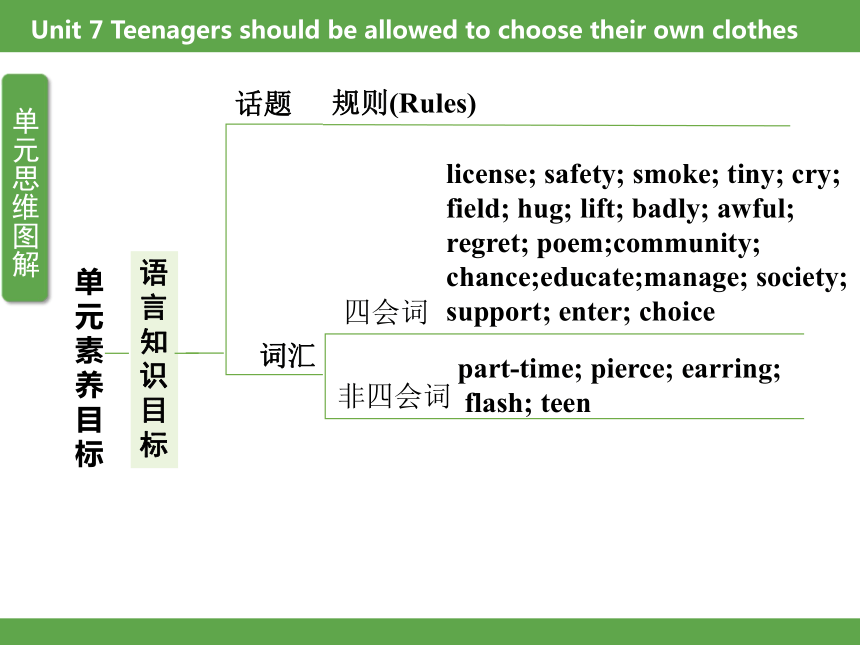
|
|
| 格式 | pptx | ||
| 文件大小 | 352.4KB | ||
| 资源类型 | 教案 | ||
| 版本资源 | 人教新目标(Go for it)版 | ||
| 科目 | 英语 | ||
| 更新时间 | 2024-07-03 22:32:29 | ||
图片预览



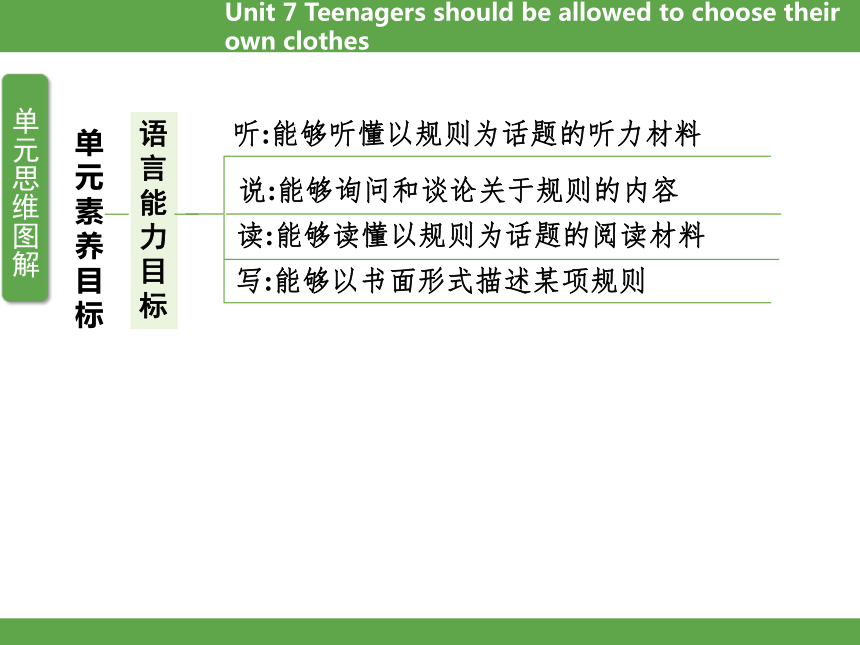
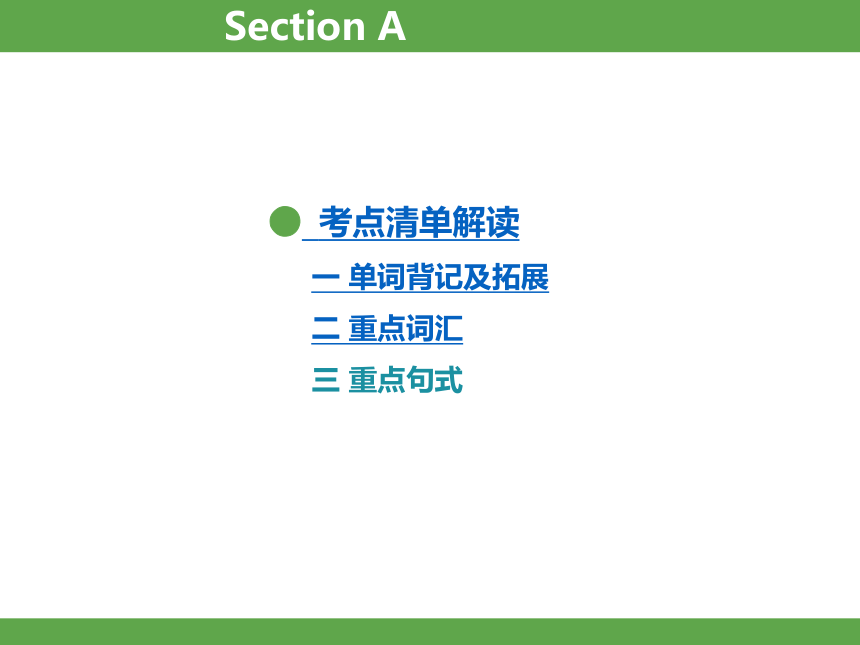
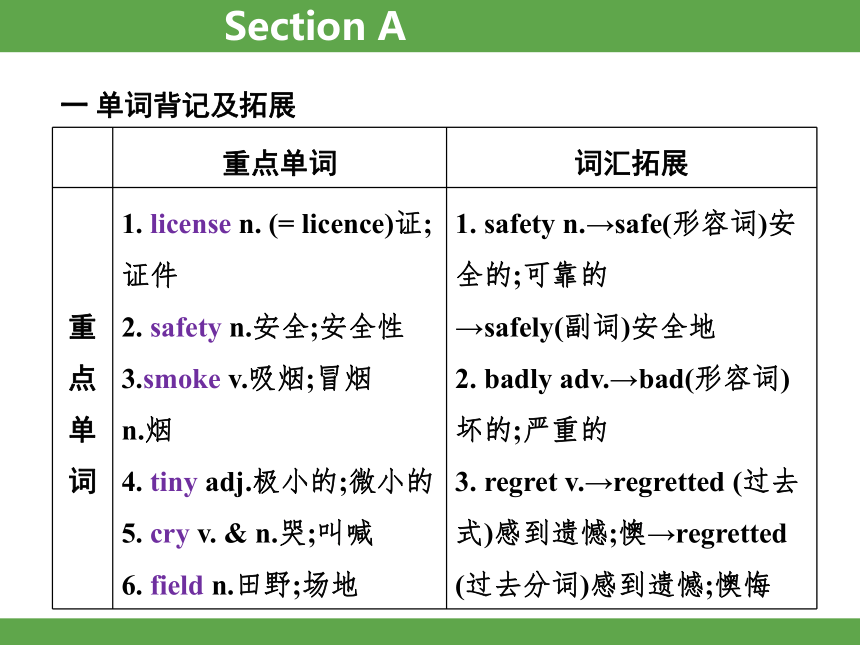

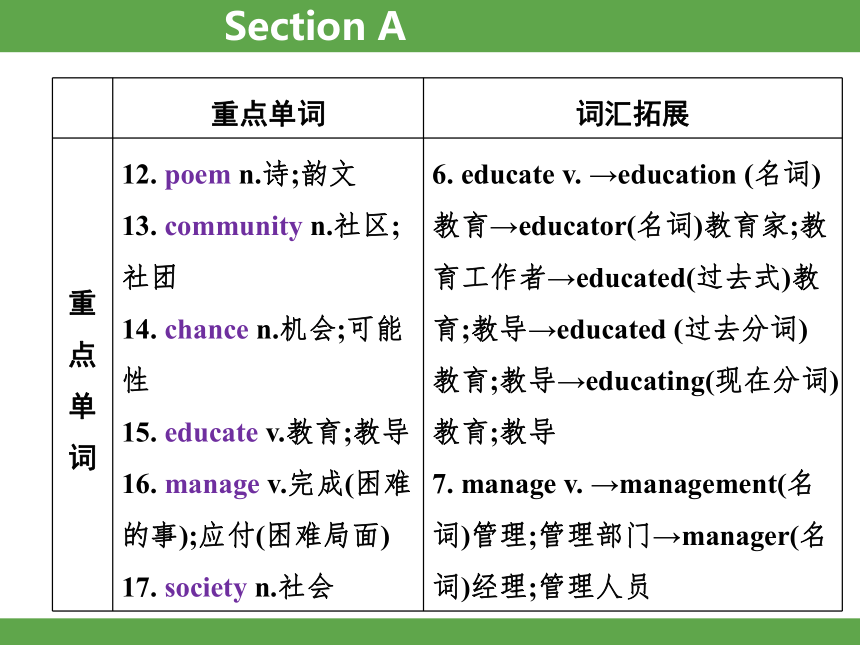
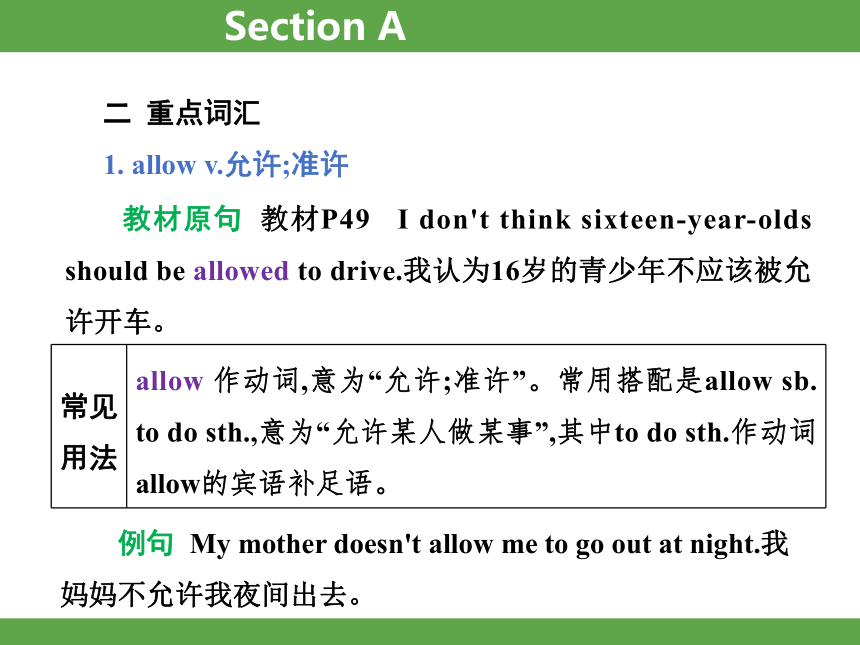

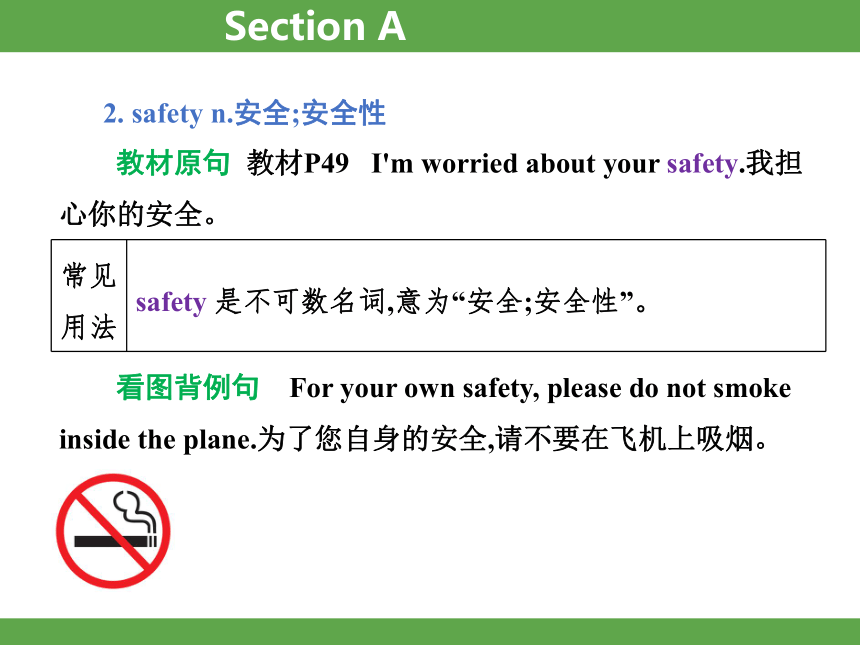
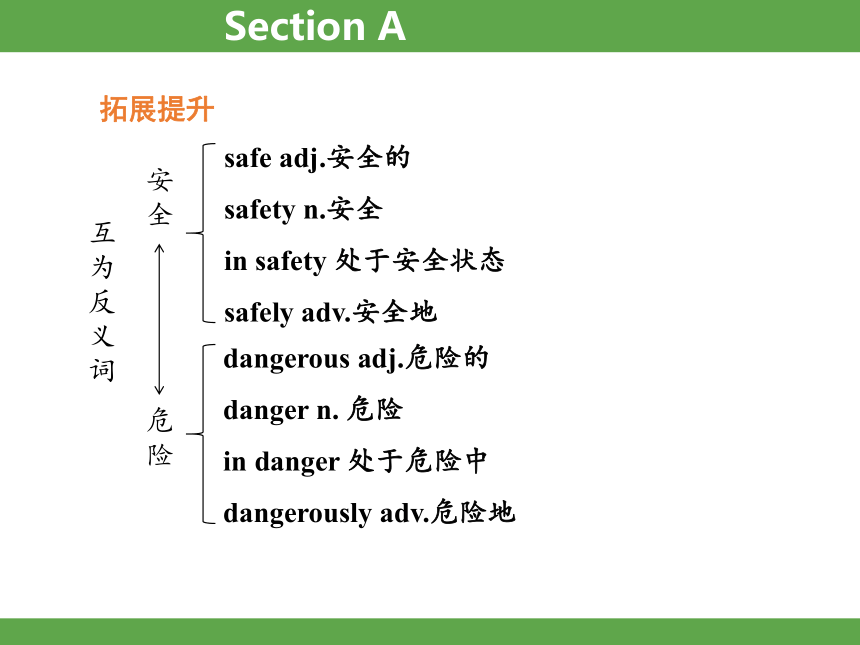
文档简介
(共63张PPT)
Unit 7 Teenagers should be allowed to choose their own clothes
语
言
知识目
标
单元素养目标
词汇
话题
规则(Rules)
四会词
license; safety; smoke; tiny; cry; field; hug; lift; badly; awful; regret; poem;community; chance;educate;manage; society; support; enter; choice
非四会词
part-time; pierce; earring;
flash; teen
语
言
知识目
标
单元素养目标
重点
短语
be worried about; cut one’s hair;
stop doing sth.; be excited about;
take photos; talk back; keep... away from;
make one’s own decision; grow up;
get in the way of
1. I don't think sixteen-year-olds should be allowed to drive.
2. They aren't serious enough.
3. Teenagers should not be allowed to have part-time jobs.
4. Sixteen-year-olds should be allowed to get their ears pierced.
5. Only then will I have a chance to achieve my dream.
重点
句型
Unit 7 Teenagers should be allowed to choose their own clothes
语
言
知识目
标
单元素养目标
语法
含有情态动词的被动语态
Unit 7 Teenagers should be allowed to choose their own clothes
语言能力目标
单元素养目标
听:能够听懂以规则为话题的听力材料
说:能够询问和谈论关于规则的内容
读:能够读懂以规则为话题的阅读材料
写:能够以书面形式描述某项规则
Unit 7 Teenagers should be allowed to choose their own clothes
● 考点清单解读
一 单词背记及拓展
二 重点词汇
三 重点句式
Section A
Section A
一 单词背记及拓展
重点单词 词汇拓展
重 点 单 词 1. license n. (= licence)证;证件 2. safety n.安全;安全性 3.smoke v.吸烟;冒烟 n.烟 4. tiny adj.极小的;微小的 5. cry v. & n.哭;叫喊 6. field n.田野;场地 1. safety n.→safe(形容词)安全的;可靠的
→safely(副词)安全地
2. badly adv.→bad(形容词)坏的;严重的
3. regret v.→regretted (过去式)感到遗憾;懊→regretted (过去分词)感到遗憾;懊悔
Section A
重点单词 词汇拓展
重 点 单 词 7. hug n.&v.拥抱;搂抱 8.lift v.举起;抬高 n.电梯;搭便车 9. badly adv.严重地;差;非常 10. awful adj.很坏的;讨厌的 11. regret v. & n.感到遗憾;懊悔 →regretting(现在分词)感到遗憾;懊悔
→regretful (形容词)后悔的;遗憾的
4. chance n. →opportunity(近义词)时机;机会
5. poem n.→poet (名词)诗人
→poetry(近义词)诗;诗歌艺术
Section A
重点单词 词汇拓展
重 点 单 词 12. poem n.诗;韵文 munity n.社区;社团 14. chance n.机会;可能性 15. educate v.教育;教导 16. manage v.完成(困难的事);应付(困难局面) 17. society n.社会 6. educate v. →education (名词)教育→educator(名词)教育家;教育工作者→educated(过去式)教育;教导→educated (过去分词)教育;教导→educating(现在分词)教育;教导
7. manage v. →management(名词)管理;管理部门→manager(名词)经理;管理人员
Section A
二 重点词汇
1. allow v.允许;准许
常见用法 allow 作动词,意为“允许;准许”。常用搭配是allow sb. to do sth.,意为“允许某人做某事”,其中to do sth.作动词allow的宾语补足语。
教材原句 教材P49 I don't think sixteen-year-olds should be allowed to drive.我认为16岁的青少年不应该被允许开车。
例句 My mother doesn't allow me to go out at night.我妈妈不允许我夜间出去。
Section A
拓展提升
有关 allow 的其他常见搭配:
allow doing sth.允许做某事
be allowed to do sth.被允许做某事(被动语态)
如:They don't allow parking here.他们不允许在这里停车。
Section A
2. safety n.安全;安全性
教材原句 教材P49 I'm worried about your safety.我担心你的安全。
看图背例句 For your own safety, please do not smoke inside the plane.为了您自身的安全,请不要在飞机上吸烟。
常见用法 safety 是不可数名词,意为“安全;安全性”。
Section A
拓展提升
互为反义词
安全
危险
safe adj.安全的
safety n.安全
in safety 处于安全状态
safely adv.安全地
dangerous adj.危险的
danger n. 危险
in danger 处于危险中
dangerously adv.危险地
Section A
3. lift y.举起;抬高 n.电梯;搭便车
教材原句 教材P51 When I fell and hurt myself, she gave me a hug and lifted me up.当我跌倒并受伤时,她给我拥抱,并把我扶起来。
常见用法 lift 作名词,意为“电梯;搭便车”,常用搭配:give sb.a lift“让某人搭便车”。也可作动词,意为“举起;抬高”,强调用体力或机械力把某物从地面举到一定的高度。
Section A
例句 After work, many people waited for the lift.下班后,好多人都在等电梯。
It's raining heavily. Can you give me a lift 下大雨了。我能搭你的便车吗
The suitcase is so heavy that she can't lift it up.这个行李箱太重了,她提不起来。
Section A
图解妙记
Section A
4. regret v. & n.感到遗憾;懊悔
教材原句 教材P51 I regret talking back, not listening to Mom.我后悔顶嘴,没有听妈妈的话。
常见用法 regret 既可作动词,又可作名词,作动词时,意为“感到遗憾;懊悔”,后可跟名词、代词、动名词或从句等。
例句 I deeply regret what I said.我非常后悔说了那些话。
I have no regrets about leaving Shanghai.我一点儿也不后悔离开上海。
Section A
易混辨析
regret doing sth.与 regret to do sth.的用法区别
短语 用法
regret doing sth. 对做过的事情表示遗憾、后悔。
regret to do sth. 对要做的事情表示遗憾,强调
事情未做。
Section A
5. chance n.机会;可能性
教材原句 教材P52 Parents should give teenagers chances to make their own decisions.父母应该给青少年自己做决定的机会。
常见用法 chance 作名词,意为“机会”,为可数名词,其后通常接to do sth.,表示“做某事的机会”。chance还可意为“可能性”,其后可接介词of,表示“……的可能性”。
例句 I'm glad to have a chance to work with you.我很高兴有机会与你共事。
Section A
拓展提升
含chance的搭配
搭配 含义
have a chance to do sth. 有机会做某事
give sb. a chance 给某人一次机会
miss a chance 错过一次机会
by chance 意外;偶然
Section A
6. manage v.完成(困难的事);应付(困难局面)
教材原句 教材P52 This way, when they start working they can manage their own lives.这样,当他们开始工作时,他们就能应付自己的生活。
常见用法 manage 意为“完成(困难的事);应付(困难局面)”,常与can,could, be able to连用。
例句 Do you suppose you can manage to get me the ticket to the concert 你认为你能给我弄到演唱会的票吗
Section A
拓展提升
manage 还可意为“管理;负责(公司、队伍、组织等)”。如:His father manages a hotel.他父亲管理一家酒店。
同根词
manage v.管理
manager n.经理
management n.管理
Section A
7. get sth. done 使……被做;使某人做……
教材原句 教材P49 Sixteen-year-olds should be allowed to get their ears pierced. 16岁的青少年应该被允许打耳洞。
常见用法 get one's ears pierced 意为“打耳洞”,其中get是使役动词,意为“使;让”。“get/have+宾语+过去分词”结构意为“使某事被做;让别人做某事”。该结构中的过去分词所表示的动作通常是由别人完成,与句子的主语无关。
例句 Mr. Black will have his car washed tomorrow.明天布莱克先生会让人把他的车洗了。
Section A
拓展提升
get 用作使役动词时,还可用于get sb. to do sth.结构,意为“使某人做某事”。如:
I can't get him to change his idea. 我不能使他改变主意。
Section A
8. keep... away from避免接近;远离
教材原句 教材P52 Do you think we must keep teenagers away from the Internet 你认为我们必须要让青少年远离互联网吗
常见用法 keep sb. away from sth.是固定搭配,意为“使某人避免接近某物;使某人远离某物”。
例句 Parents hope to keep their children away from the danger.父母希望使他们的孩子远离危险。
Section A
拓展提升
keep 的相关短语
keep off 不接近含义
keep away from 远离……
keep doing sth.坚持做某事
keep up with 跟上;赶上
keep in touch with sb.和某人
保持联系
keep on doing sth.继续做某事
Section A
9. make one's own decision自己做决定
教材原句 教材P52 Parents should give teenagers chances to make their own decisions.父母应该给青少年自己做决定的机会。
常见用法 make one's own decision是固定搭配,意为“自己做决定”。其中own是形容词,意为“自己的”。
例句 It’s time for you to make your own decision.到你自己做决定的时候了。
Section A
拓展提升
make the decision to do sth.意为“决定做某事”,相当于 decide to do sth.。
Section A
三 重点句式
宾语从句的否定转移
教材原句 教材P49 I don't think sixteen-year-olds should be allowed to drive.我认为16岁的青少年不应该被允许开车。
常见用法 本句为宾语从句的否定转移。当主句的谓语动词是think,believe 等表示“想;认为”等意义的动词,主句的主语是第一人称且主句是一般现在时,则从句的否定形式一般要转移到主句中。
Section A
例句 I don't think that's his fault.我认为那不是他的过错。
易错提示
若主句的主语是第二、三人称,变否定句时,要在从句上否定;变为反意疑问句时,附加疑问句的主语和谓语与主句部分保持一致。
如:They think you are not right.他们认为你是不对的。
They think you are right, don't they 他们认为你是对的,不是吗
● 考点清单解读
一 单词背记及拓展
二 重点词汇
三 重点句式
四 重点语法
Section B
Section B
一 单词背记及拓展
重点单词 词汇拓展
重 点 单 词 1. support v. & n.支持 2. enter v.进来;进去 3. choice n.选择;挑选 1. support v.→supported (过去式/过去分词)支持
2. enter v.→entered(过去式)进来;进去
→entered (过去分词)进来;进去
3. choice n. →choose(动词)选择;挑选
Section B
二 重点词汇
1. be strict with sb.对某人要求严格
常见用法 be strict with sb.表示“对某人要求严格”。
教材原句 教材P53 Parents should not be too strict with teenagers.父母不应该对青少年要求太严格。
例句 Mr. Smith is very strict with us in class. But after class, he is friendly to us all.史密斯老师在课堂上对我们要求非常严格。但是,下课后,他对我们所有人都很友好。
Section B
拓展提升
be strict in/ about sth.表示“对某事要求严格”。
一言辨异
Our English teacher is strict with us and she is strict in our homework.我们的英语老师对我们要求严格,她对我们的家庭作业也要求严格。
Section B
2. support v. & n.支持
教材原句 教材P54 My wife and I have supported every one of his races.我和我的妻子支持他的每一场比赛。
常见用法 support 作动词,意为“支持”。support sb./ sth. (in...)意为“(在……方面)支持某人/某事”。
例句 He has always supported the stronger soccer team.他一直支持较强的足球队。
Section B
拓展提升
(1)support 作名词,意为“支持”,是不可数名词。
如:We offer free technical support.我们免费提供技术支持。
(2)support 作动词,还可意为“养活;赡养;资助;赞助”。
如:He has a large family to support.他有一大家子要养活。
Section B
3. choice n.选择;挑选
教材原句 教材P54 I think I should be allowed to make this choice myself.我觉得应该允许我自己做这个选择。
常见用法 choice 意为“选择;挑选”,其动词形式为choose。make a
choice/ choices做出选择。
例句 At the moment, you must make a final choice.此时此刻,你必须做出最终的选择。
Section B
拓展提升
choice
同根词
常用搭配
choose v.选择;挑选
过去式:chose
过去分词:chosen
have no choice
别无选择
choose to do sth.
选择做某事
Section B
4. enter v. 进来;进去
教材原句 教材P54 My parents have always taught me how important it is to work hard at school and enter university.我的父母总是教育我在学校刻苦学习和进入大学是多么重要。
常见用法 enter 为动词,意为“进来;进去”,其用法如下:
(1)表示进入某一具体的地方。
(2)表示进入某一组织或某一机构。
(3)表示开始从事某种职业。
Section B
易错提示
enter 后通常不与介词into 连用。
例句 The train entered the tunnel.火车进入隧道。
拓展提升
(1)enter 还可意为“报名参加”。如:Many children entered the competition.许多孩子报名参加了比赛。
(2)entrance 为名词,意为“入口”。
Section B
5. get in the way of 挡……的路;妨碍
教材原句 教材P54 But sometimes these can get in the way of their schoolwork, and parents might worry about their success at school.但是有时这些可能妨碍他们的学业,父母可能会担心他们在学校里的成功。
常见用法 get in the way of是固定搭配,意为“挡……的路;妨碍”,后接名词、代词或动词-ing形式。
例句 Don't let the social media get in the way of your study.不要让社交媒体影响你的学业。
Section B
易混辨析
in the way, on the/ one's way(to...), by the way 与 in this way的用法区别
易混词组 含义
in the way 挡……的路
on the/ one's way (to...) 在(去..…的)路上
by the way 顺便说一下
in this way 用这种方式
Section B
6. have nothing against...不反对……
教材原句 教材P54 We have nothing against running!我们不反对跑步!
常见用法 have nothing against sth./ doing sth.表示“不反对某事/做某事”。against 是介词,意为“反对;违背”,后跟名词或动词-ing形式,反义词是for。
例句 I have nothing against playing games.我不反对玩游戏。People are for peace and against war.人们都支持和平,反对战争。
Section B
拓展提升
against 还可以表示“紧靠;与……对抗,碰;撞”等含义。
如:Our school played against their school at baseball.我们学校和他们学校进行了棒球对抗赛。
Section B
7. as much as 与……一样多
教材原句 教材P54 Teenagers often think they should be allowed to practice their hobbies as much as they want.青少年经常认为他们应该按他们所想的尽可能多地被允许去练习自己的业余爱好。
常见用法 本句是一个主从复合句,they should be allowed to practice their hobbies as much as they want是宾语从句,作动词think的宾语。as much as 意为“与……一样多;如……那么多;……之多(与表示金钱的数词连用)”,强调多。
Section B
拓展提升
as much as 结构还可以用于as much as possible/ one can中,表示“尽量;尽最大努力/可能”。如:I have helped them as much as I can.我已尽我所能帮助他们了。
例句 In fact, the smart phone cost my father as much as 5,000 yuan.实际上,这款智能手机花费了我爸爸5000 元。
Section B
三 重点句式
1.倒装句
教材原句 教材P54 Only then will I have a chance to achieve my dream.只有那样我才会有一次实现梦想的机会。
常见用法 副词only置于句首,强调方式状语、条件状语、地点状语、时间状语等时,句子要进行部分倒装。如果被only所强调的状语为状语从句,该状语从句不倒装,只对主句进行倒装。
例句 Only in this way can you learn English well.只有这样你才能学好英语。
Section B
易错提示
如果放于句首的only 所修饰的不是状语时,该句不用倒装。如:
Only John can save me.只有约翰能够救我。
Only some of the young people passed the driving test.只有一些年轻人通过了驾照考试。
Section B
2.if 引导的条件状语从句
教材原句 教材P54 They always talk about what will happen if I don't succeed.他们总是谈论如果我不成功会发生什么。
常见用法 本句的宾语从句中含if引导的条件状语从句,从句用一般现在时表示将来,主句用一般将来时。
例句 We will go fishing if it doesn't rain tomorrow.如果明天不下雨,我们将去钓鱼。
Section B
易错提示
(1)含f引导的条件状语从句的复合句中,若主句、从句的动作均未发生,则主句用一般将来时、祈使句或含情态动词的句子,从句用一般现在时代替一般将来时。
(2)若if 表示“是否”引导宾语从句时,根据句子意思确定相应的时态,if后可用一般将来时。
Section B
含有情态动词的被动语态
教材原句 教材P49 Teenagers should be allowed to choose their own clothes.应该允许青少年选择他们自己的衣服。
四、重点语法
常见用法
1.含有情态动词的被动语态的结构
含有情态动词的被动语态用来说明某个被动性动作所反映出的感情和态度。初中阶段常见的与被动语态一起连用的情态动词有can,may, must, need, should等。谓语部分含有情态动词的被动语态的构成是:情态动词+be+及物动词的过去分词。
Section B
2. 含有情态动词的被动语态的基本句式
句式 构成 例句
肯定句 主语+情态动词+be+及物动词的过去分词(+by+宾语)+其他. Your homework should be finished by yourself.你应该自己完成作业。
否定句 主语+情态动词+not be+及物动词的过去分词(+by+宾语)+其他. This work needn't be
done at once.这项工作没必要立即做。
Section B
一般疑问句 情态动词+主语+be+及物动词的过去分词(+by+宾语)+其他 Must this work be done at once 这项工作必须立即完成吗
特殊疑问句 疑问词+情态动词(+主语)+be +及物动词的过去分词(+by+宾语)+其他 Where can the lost book be found 这本丢失的书能在什么地方被找到
Section B
拓展提升
含有情态动词的主动句与被动句之间的转换
含有情态动词的主动句变为被动句时,要把主动句的宾语变为被动句的主语,主动句的谓语变为“情态动词+be+及物动词的过去分词”;主动句的主语变为介词by 的宾语(如果不强调动作的执行者,by短语常可省略)。如:
主动句:She must clean her room every day.她每天必须打扫她的房间。
被动句:Her room must be cleaned (by her) every day.她的房间每天都必须打扫。
语篇考法精讲
代词指代题解题技巧
典例剖析
Max and Holly sat beside each other in a classroom. Their teacher Miss Carrstood at the front of the classroom and looked at them with a strange stare.“Silence!”Miss Carr shouted. “You're only allowed to speak if you want to say ‘I'd like to do extra hard MATH’, understand ”
Then the bell rang for lunchtime and everyone jumped to their feet.“Sit down!”shouted Miss Carr. Everyone did as they were told.Miss Carr held up some sheets of paper. “These are new school rules,
语篇考法精讲
written by our wonderful new headteacher, Mr. Roberts," she said.“You must do exactly as they say from this moment on. I want everyone to take a copy for your parents."
“Look at this!”Max said, reading the first line. “Rule One: No pupil will be allowed to go out at playtime unless they have passed a daily spelling test.” Max and Holly then continued to look at the other new school rules.
“Rule Two: We're not supposed to be in here at lunchtime.”
“Rule Three: Pupils must eat cabbage stew or sprout surprise for lunch.”
语篇考法精讲
“Rule Four: All P.E. will now take place outdoors——no matter what the weather is.”
...
“Something’s wrong,” said Holly. “Things have been strange ever since Mr. Roberts took over as our headteacher last week. We need to find out what's going on.”
Then Max and Holly walked to the teachers’office and stepped inside, surprised to find that many teachers had been tied up in the room! From their words, Max and Holly knew that the teacher in the classroom just now was just a robot clone (克隆)
语篇考法精讲
and she was not real Miss Carr, even the new headmaster! Max and Holly then succeeded in freeing all the teachers trapped.
“We'll deal with those rotten robots!” said one of the teachers, as they ran out of the room.
“How can I ever thank you, Max ” asked the real Miss Carr.
“How about no homework for the rest of the school year ”
Finally, Max and Holly realized that the school rules made by their real headmaster were so nice.
语篇考法精讲
[中考新考法·代词指代]
The underlined word “they”in Paragraph 2 may refer to“______”.
A. school rules
B. teachers
C. your parents
D. pieces of paper
语篇考法精讲
[解析]根据第二段提到的“‘These are new school rules, written by our wonderful new headteacher,Mr. Roberts,’she said. ‘You must do exactly as they say from this moment on. I want everyone to take a copy for your parents.’(“这些是新的校规,是由我们优秀的新校长罗伯茨先生写的。”她说,“从现在开始,你们必须按照它们说的去做。我希望每个人都为你们的父母带一份副本。”)”可知,they指的是“校规”。
[答案] A
语篇考法精讲
考法说明
代词指代题要求考生根据一定的语境推测代词 (如it, they, them, one,that等)所指代的内容。解这类题时,可根据语境在代词所在句或上文中寻找代词所指代的名词、名词性短语或句子,然后将其替换至代词所在的句子中,看句意是否符合上下文逻辑、语法是否正确。
代词指代题常见的类型有:
1.The word“...”in the passage probably means ___.
语篇考法精讲
2. The underlined word “...”in the passage refers to.
3. In this story the underlined word“...”means __.
4. Here“...”means __.
语篇考法精讲
技巧点拨
解题步骤:
1.定指代对象。
要首先分析前后文,明确代词所指代的对象是人还是物,避免误判,要有目的地做题,才能真正做到有的放矢。
2.确定指代对象的数量。
代词指代的是可数名词还是不可数名词,一定要在理解句意的基础上进行判断,只有判断准确,才能正确理解句意,准确理解题目的要求。
语篇考法精讲
3.确定指代范围。
在认真阅读的基础上明确代词的指代范围。只有明确代词所表示的具体范围,才能搞清楚文章的逻辑关系和前后文的联系,正确理解文章的中心思想。
Unit 7 Teenagers should be allowed to choose their own clothes
语
言
知识目
标
单元素养目标
词汇
话题
规则(Rules)
四会词
license; safety; smoke; tiny; cry; field; hug; lift; badly; awful; regret; poem;community; chance;educate;manage; society; support; enter; choice
非四会词
part-time; pierce; earring;
flash; teen
语
言
知识目
标
单元素养目标
重点
短语
be worried about; cut one’s hair;
stop doing sth.; be excited about;
take photos; talk back; keep... away from;
make one’s own decision; grow up;
get in the way of
1. I don't think sixteen-year-olds should be allowed to drive.
2. They aren't serious enough.
3. Teenagers should not be allowed to have part-time jobs.
4. Sixteen-year-olds should be allowed to get their ears pierced.
5. Only then will I have a chance to achieve my dream.
重点
句型
Unit 7 Teenagers should be allowed to choose their own clothes
语
言
知识目
标
单元素养目标
语法
含有情态动词的被动语态
Unit 7 Teenagers should be allowed to choose their own clothes
语言能力目标
单元素养目标
听:能够听懂以规则为话题的听力材料
说:能够询问和谈论关于规则的内容
读:能够读懂以规则为话题的阅读材料
写:能够以书面形式描述某项规则
Unit 7 Teenagers should be allowed to choose their own clothes
● 考点清单解读
一 单词背记及拓展
二 重点词汇
三 重点句式
Section A
Section A
一 单词背记及拓展
重点单词 词汇拓展
重 点 单 词 1. license n. (= licence)证;证件 2. safety n.安全;安全性 3.smoke v.吸烟;冒烟 n.烟 4. tiny adj.极小的;微小的 5. cry v. & n.哭;叫喊 6. field n.田野;场地 1. safety n.→safe(形容词)安全的;可靠的
→safely(副词)安全地
2. badly adv.→bad(形容词)坏的;严重的
3. regret v.→regretted (过去式)感到遗憾;懊→regretted (过去分词)感到遗憾;懊悔
Section A
重点单词 词汇拓展
重 点 单 词 7. hug n.&v.拥抱;搂抱 8.lift v.举起;抬高 n.电梯;搭便车 9. badly adv.严重地;差;非常 10. awful adj.很坏的;讨厌的 11. regret v. & n.感到遗憾;懊悔 →regretting(现在分词)感到遗憾;懊悔
→regretful (形容词)后悔的;遗憾的
4. chance n. →opportunity(近义词)时机;机会
5. poem n.→poet (名词)诗人
→poetry(近义词)诗;诗歌艺术
Section A
重点单词 词汇拓展
重 点 单 词 12. poem n.诗;韵文 munity n.社区;社团 14. chance n.机会;可能性 15. educate v.教育;教导 16. manage v.完成(困难的事);应付(困难局面) 17. society n.社会 6. educate v. →education (名词)教育→educator(名词)教育家;教育工作者→educated(过去式)教育;教导→educated (过去分词)教育;教导→educating(现在分词)教育;教导
7. manage v. →management(名词)管理;管理部门→manager(名词)经理;管理人员
Section A
二 重点词汇
1. allow v.允许;准许
常见用法 allow 作动词,意为“允许;准许”。常用搭配是allow sb. to do sth.,意为“允许某人做某事”,其中to do sth.作动词allow的宾语补足语。
教材原句 教材P49 I don't think sixteen-year-olds should be allowed to drive.我认为16岁的青少年不应该被允许开车。
例句 My mother doesn't allow me to go out at night.我妈妈不允许我夜间出去。
Section A
拓展提升
有关 allow 的其他常见搭配:
allow doing sth.允许做某事
be allowed to do sth.被允许做某事(被动语态)
如:They don't allow parking here.他们不允许在这里停车。
Section A
2. safety n.安全;安全性
教材原句 教材P49 I'm worried about your safety.我担心你的安全。
看图背例句 For your own safety, please do not smoke inside the plane.为了您自身的安全,请不要在飞机上吸烟。
常见用法 safety 是不可数名词,意为“安全;安全性”。
Section A
拓展提升
互为反义词
安全
危险
safe adj.安全的
safety n.安全
in safety 处于安全状态
safely adv.安全地
dangerous adj.危险的
danger n. 危险
in danger 处于危险中
dangerously adv.危险地
Section A
3. lift y.举起;抬高 n.电梯;搭便车
教材原句 教材P51 When I fell and hurt myself, she gave me a hug and lifted me up.当我跌倒并受伤时,她给我拥抱,并把我扶起来。
常见用法 lift 作名词,意为“电梯;搭便车”,常用搭配:give sb.a lift“让某人搭便车”。也可作动词,意为“举起;抬高”,强调用体力或机械力把某物从地面举到一定的高度。
Section A
例句 After work, many people waited for the lift.下班后,好多人都在等电梯。
It's raining heavily. Can you give me a lift 下大雨了。我能搭你的便车吗
The suitcase is so heavy that she can't lift it up.这个行李箱太重了,她提不起来。
Section A
图解妙记
Section A
4. regret v. & n.感到遗憾;懊悔
教材原句 教材P51 I regret talking back, not listening to Mom.我后悔顶嘴,没有听妈妈的话。
常见用法 regret 既可作动词,又可作名词,作动词时,意为“感到遗憾;懊悔”,后可跟名词、代词、动名词或从句等。
例句 I deeply regret what I said.我非常后悔说了那些话。
I have no regrets about leaving Shanghai.我一点儿也不后悔离开上海。
Section A
易混辨析
regret doing sth.与 regret to do sth.的用法区别
短语 用法
regret doing sth. 对做过的事情表示遗憾、后悔。
regret to do sth. 对要做的事情表示遗憾,强调
事情未做。
Section A
5. chance n.机会;可能性
教材原句 教材P52 Parents should give teenagers chances to make their own decisions.父母应该给青少年自己做决定的机会。
常见用法 chance 作名词,意为“机会”,为可数名词,其后通常接to do sth.,表示“做某事的机会”。chance还可意为“可能性”,其后可接介词of,表示“……的可能性”。
例句 I'm glad to have a chance to work with you.我很高兴有机会与你共事。
Section A
拓展提升
含chance的搭配
搭配 含义
have a chance to do sth. 有机会做某事
give sb. a chance 给某人一次机会
miss a chance 错过一次机会
by chance 意外;偶然
Section A
6. manage v.完成(困难的事);应付(困难局面)
教材原句 教材P52 This way, when they start working they can manage their own lives.这样,当他们开始工作时,他们就能应付自己的生活。
常见用法 manage 意为“完成(困难的事);应付(困难局面)”,常与can,could, be able to连用。
例句 Do you suppose you can manage to get me the ticket to the concert 你认为你能给我弄到演唱会的票吗
Section A
拓展提升
manage 还可意为“管理;负责(公司、队伍、组织等)”。如:His father manages a hotel.他父亲管理一家酒店。
同根词
manage v.管理
manager n.经理
management n.管理
Section A
7. get sth. done 使……被做;使某人做……
教材原句 教材P49 Sixteen-year-olds should be allowed to get their ears pierced. 16岁的青少年应该被允许打耳洞。
常见用法 get one's ears pierced 意为“打耳洞”,其中get是使役动词,意为“使;让”。“get/have+宾语+过去分词”结构意为“使某事被做;让别人做某事”。该结构中的过去分词所表示的动作通常是由别人完成,与句子的主语无关。
例句 Mr. Black will have his car washed tomorrow.明天布莱克先生会让人把他的车洗了。
Section A
拓展提升
get 用作使役动词时,还可用于get sb. to do sth.结构,意为“使某人做某事”。如:
I can't get him to change his idea. 我不能使他改变主意。
Section A
8. keep... away from避免接近;远离
教材原句 教材P52 Do you think we must keep teenagers away from the Internet 你认为我们必须要让青少年远离互联网吗
常见用法 keep sb. away from sth.是固定搭配,意为“使某人避免接近某物;使某人远离某物”。
例句 Parents hope to keep their children away from the danger.父母希望使他们的孩子远离危险。
Section A
拓展提升
keep 的相关短语
keep off 不接近含义
keep away from 远离……
keep doing sth.坚持做某事
keep up with 跟上;赶上
keep in touch with sb.和某人
保持联系
keep on doing sth.继续做某事
Section A
9. make one's own decision自己做决定
教材原句 教材P52 Parents should give teenagers chances to make their own decisions.父母应该给青少年自己做决定的机会。
常见用法 make one's own decision是固定搭配,意为“自己做决定”。其中own是形容词,意为“自己的”。
例句 It’s time for you to make your own decision.到你自己做决定的时候了。
Section A
拓展提升
make the decision to do sth.意为“决定做某事”,相当于 decide to do sth.。
Section A
三 重点句式
宾语从句的否定转移
教材原句 教材P49 I don't think sixteen-year-olds should be allowed to drive.我认为16岁的青少年不应该被允许开车。
常见用法 本句为宾语从句的否定转移。当主句的谓语动词是think,believe 等表示“想;认为”等意义的动词,主句的主语是第一人称且主句是一般现在时,则从句的否定形式一般要转移到主句中。
Section A
例句 I don't think that's his fault.我认为那不是他的过错。
易错提示
若主句的主语是第二、三人称,变否定句时,要在从句上否定;变为反意疑问句时,附加疑问句的主语和谓语与主句部分保持一致。
如:They think you are not right.他们认为你是不对的。
They think you are right, don't they 他们认为你是对的,不是吗
● 考点清单解读
一 单词背记及拓展
二 重点词汇
三 重点句式
四 重点语法
Section B
Section B
一 单词背记及拓展
重点单词 词汇拓展
重 点 单 词 1. support v. & n.支持 2. enter v.进来;进去 3. choice n.选择;挑选 1. support v.→supported (过去式/过去分词)支持
2. enter v.→entered(过去式)进来;进去
→entered (过去分词)进来;进去
3. choice n. →choose(动词)选择;挑选
Section B
二 重点词汇
1. be strict with sb.对某人要求严格
常见用法 be strict with sb.表示“对某人要求严格”。
教材原句 教材P53 Parents should not be too strict with teenagers.父母不应该对青少年要求太严格。
例句 Mr. Smith is very strict with us in class. But after class, he is friendly to us all.史密斯老师在课堂上对我们要求非常严格。但是,下课后,他对我们所有人都很友好。
Section B
拓展提升
be strict in/ about sth.表示“对某事要求严格”。
一言辨异
Our English teacher is strict with us and she is strict in our homework.我们的英语老师对我们要求严格,她对我们的家庭作业也要求严格。
Section B
2. support v. & n.支持
教材原句 教材P54 My wife and I have supported every one of his races.我和我的妻子支持他的每一场比赛。
常见用法 support 作动词,意为“支持”。support sb./ sth. (in...)意为“(在……方面)支持某人/某事”。
例句 He has always supported the stronger soccer team.他一直支持较强的足球队。
Section B
拓展提升
(1)support 作名词,意为“支持”,是不可数名词。
如:We offer free technical support.我们免费提供技术支持。
(2)support 作动词,还可意为“养活;赡养;资助;赞助”。
如:He has a large family to support.他有一大家子要养活。
Section B
3. choice n.选择;挑选
教材原句 教材P54 I think I should be allowed to make this choice myself.我觉得应该允许我自己做这个选择。
常见用法 choice 意为“选择;挑选”,其动词形式为choose。make a
choice/ choices做出选择。
例句 At the moment, you must make a final choice.此时此刻,你必须做出最终的选择。
Section B
拓展提升
choice
同根词
常用搭配
choose v.选择;挑选
过去式:chose
过去分词:chosen
have no choice
别无选择
choose to do sth.
选择做某事
Section B
4. enter v. 进来;进去
教材原句 教材P54 My parents have always taught me how important it is to work hard at school and enter university.我的父母总是教育我在学校刻苦学习和进入大学是多么重要。
常见用法 enter 为动词,意为“进来;进去”,其用法如下:
(1)表示进入某一具体的地方。
(2)表示进入某一组织或某一机构。
(3)表示开始从事某种职业。
Section B
易错提示
enter 后通常不与介词into 连用。
例句 The train entered the tunnel.火车进入隧道。
拓展提升
(1)enter 还可意为“报名参加”。如:Many children entered the competition.许多孩子报名参加了比赛。
(2)entrance 为名词,意为“入口”。
Section B
5. get in the way of 挡……的路;妨碍
教材原句 教材P54 But sometimes these can get in the way of their schoolwork, and parents might worry about their success at school.但是有时这些可能妨碍他们的学业,父母可能会担心他们在学校里的成功。
常见用法 get in the way of是固定搭配,意为“挡……的路;妨碍”,后接名词、代词或动词-ing形式。
例句 Don't let the social media get in the way of your study.不要让社交媒体影响你的学业。
Section B
易混辨析
in the way, on the/ one's way(to...), by the way 与 in this way的用法区别
易混词组 含义
in the way 挡……的路
on the/ one's way (to...) 在(去..…的)路上
by the way 顺便说一下
in this way 用这种方式
Section B
6. have nothing against...不反对……
教材原句 教材P54 We have nothing against running!我们不反对跑步!
常见用法 have nothing against sth./ doing sth.表示“不反对某事/做某事”。against 是介词,意为“反对;违背”,后跟名词或动词-ing形式,反义词是for。
例句 I have nothing against playing games.我不反对玩游戏。People are for peace and against war.人们都支持和平,反对战争。
Section B
拓展提升
against 还可以表示“紧靠;与……对抗,碰;撞”等含义。
如:Our school played against their school at baseball.我们学校和他们学校进行了棒球对抗赛。
Section B
7. as much as 与……一样多
教材原句 教材P54 Teenagers often think they should be allowed to practice their hobbies as much as they want.青少年经常认为他们应该按他们所想的尽可能多地被允许去练习自己的业余爱好。
常见用法 本句是一个主从复合句,they should be allowed to practice their hobbies as much as they want是宾语从句,作动词think的宾语。as much as 意为“与……一样多;如……那么多;……之多(与表示金钱的数词连用)”,强调多。
Section B
拓展提升
as much as 结构还可以用于as much as possible/ one can中,表示“尽量;尽最大努力/可能”。如:I have helped them as much as I can.我已尽我所能帮助他们了。
例句 In fact, the smart phone cost my father as much as 5,000 yuan.实际上,这款智能手机花费了我爸爸5000 元。
Section B
三 重点句式
1.倒装句
教材原句 教材P54 Only then will I have a chance to achieve my dream.只有那样我才会有一次实现梦想的机会。
常见用法 副词only置于句首,强调方式状语、条件状语、地点状语、时间状语等时,句子要进行部分倒装。如果被only所强调的状语为状语从句,该状语从句不倒装,只对主句进行倒装。
例句 Only in this way can you learn English well.只有这样你才能学好英语。
Section B
易错提示
如果放于句首的only 所修饰的不是状语时,该句不用倒装。如:
Only John can save me.只有约翰能够救我。
Only some of the young people passed the driving test.只有一些年轻人通过了驾照考试。
Section B
2.if 引导的条件状语从句
教材原句 教材P54 They always talk about what will happen if I don't succeed.他们总是谈论如果我不成功会发生什么。
常见用法 本句的宾语从句中含if引导的条件状语从句,从句用一般现在时表示将来,主句用一般将来时。
例句 We will go fishing if it doesn't rain tomorrow.如果明天不下雨,我们将去钓鱼。
Section B
易错提示
(1)含f引导的条件状语从句的复合句中,若主句、从句的动作均未发生,则主句用一般将来时、祈使句或含情态动词的句子,从句用一般现在时代替一般将来时。
(2)若if 表示“是否”引导宾语从句时,根据句子意思确定相应的时态,if后可用一般将来时。
Section B
含有情态动词的被动语态
教材原句 教材P49 Teenagers should be allowed to choose their own clothes.应该允许青少年选择他们自己的衣服。
四、重点语法
常见用法
1.含有情态动词的被动语态的结构
含有情态动词的被动语态用来说明某个被动性动作所反映出的感情和态度。初中阶段常见的与被动语态一起连用的情态动词有can,may, must, need, should等。谓语部分含有情态动词的被动语态的构成是:情态动词+be+及物动词的过去分词。
Section B
2. 含有情态动词的被动语态的基本句式
句式 构成 例句
肯定句 主语+情态动词+be+及物动词的过去分词(+by+宾语)+其他. Your homework should be finished by yourself.你应该自己完成作业。
否定句 主语+情态动词+not be+及物动词的过去分词(+by+宾语)+其他. This work needn't be
done at once.这项工作没必要立即做。
Section B
一般疑问句 情态动词+主语+be+及物动词的过去分词(+by+宾语)+其他 Must this work be done at once 这项工作必须立即完成吗
特殊疑问句 疑问词+情态动词(+主语)+be +及物动词的过去分词(+by+宾语)+其他 Where can the lost book be found 这本丢失的书能在什么地方被找到
Section B
拓展提升
含有情态动词的主动句与被动句之间的转换
含有情态动词的主动句变为被动句时,要把主动句的宾语变为被动句的主语,主动句的谓语变为“情态动词+be+及物动词的过去分词”;主动句的主语变为介词by 的宾语(如果不强调动作的执行者,by短语常可省略)。如:
主动句:She must clean her room every day.她每天必须打扫她的房间。
被动句:Her room must be cleaned (by her) every day.她的房间每天都必须打扫。
语篇考法精讲
代词指代题解题技巧
典例剖析
Max and Holly sat beside each other in a classroom. Their teacher Miss Carrstood at the front of the classroom and looked at them with a strange stare.“Silence!”Miss Carr shouted. “You're only allowed to speak if you want to say ‘I'd like to do extra hard MATH’, understand ”
Then the bell rang for lunchtime and everyone jumped to their feet.“Sit down!”shouted Miss Carr. Everyone did as they were told.Miss Carr held up some sheets of paper. “These are new school rules,
语篇考法精讲
written by our wonderful new headteacher, Mr. Roberts," she said.“You must do exactly as they say from this moment on. I want everyone to take a copy for your parents."
“Look at this!”Max said, reading the first line. “Rule One: No pupil will be allowed to go out at playtime unless they have passed a daily spelling test.” Max and Holly then continued to look at the other new school rules.
“Rule Two: We're not supposed to be in here at lunchtime.”
“Rule Three: Pupils must eat cabbage stew or sprout surprise for lunch.”
语篇考法精讲
“Rule Four: All P.E. will now take place outdoors——no matter what the weather is.”
...
“Something’s wrong,” said Holly. “Things have been strange ever since Mr. Roberts took over as our headteacher last week. We need to find out what's going on.”
Then Max and Holly walked to the teachers’office and stepped inside, surprised to find that many teachers had been tied up in the room! From their words, Max and Holly knew that the teacher in the classroom just now was just a robot clone (克隆)
语篇考法精讲
and she was not real Miss Carr, even the new headmaster! Max and Holly then succeeded in freeing all the teachers trapped.
“We'll deal with those rotten robots!” said one of the teachers, as they ran out of the room.
“How can I ever thank you, Max ” asked the real Miss Carr.
“How about no homework for the rest of the school year ”
Finally, Max and Holly realized that the school rules made by their real headmaster were so nice.
语篇考法精讲
[中考新考法·代词指代]
The underlined word “they”in Paragraph 2 may refer to“______”.
A. school rules
B. teachers
C. your parents
D. pieces of paper
语篇考法精讲
[解析]根据第二段提到的“‘These are new school rules, written by our wonderful new headteacher,Mr. Roberts,’she said. ‘You must do exactly as they say from this moment on. I want everyone to take a copy for your parents.’(“这些是新的校规,是由我们优秀的新校长罗伯茨先生写的。”她说,“从现在开始,你们必须按照它们说的去做。我希望每个人都为你们的父母带一份副本。”)”可知,they指的是“校规”。
[答案] A
语篇考法精讲
考法说明
代词指代题要求考生根据一定的语境推测代词 (如it, they, them, one,that等)所指代的内容。解这类题时,可根据语境在代词所在句或上文中寻找代词所指代的名词、名词性短语或句子,然后将其替换至代词所在的句子中,看句意是否符合上下文逻辑、语法是否正确。
代词指代题常见的类型有:
1.The word“...”in the passage probably means ___.
语篇考法精讲
2. The underlined word “...”in the passage refers to.
3. In this story the underlined word“...”means __.
4. Here“...”means __.
语篇考法精讲
技巧点拨
解题步骤:
1.定指代对象。
要首先分析前后文,明确代词所指代的对象是人还是物,避免误判,要有目的地做题,才能真正做到有的放矢。
2.确定指代对象的数量。
代词指代的是可数名词还是不可数名词,一定要在理解句意的基础上进行判断,只有判断准确,才能正确理解句意,准确理解题目的要求。
语篇考法精讲
3.确定指代范围。
在认真阅读的基础上明确代词的指代范围。只有明确代词所表示的具体范围,才能搞清楚文章的逻辑关系和前后文的联系,正确理解文章的中心思想。
同课章节目录
- Unit 1 How can we become good learners.
- Section A
- Section B
- Unit 2 I think that mooncakes are delicious!
- Section A
- Section B
- Unit 3 Could you please tell me where the restroom
- Section A
- Section B
- Unit 4 I used to be afraid of the dark.
- Section A
- Section B
- Unit 5 What are the shirts made of?
- Section A
- Section B
- Review of Units 1-5
- Unit 6 When was it invented?
- Section A
- Section B
- Unit 7 Teenagers should be allowed to choose their
- Section A
- Section B
- Unit 8 It must belong to Carla.
- Section A
- Section B
- Unit 9 I like music that I can dance to.
- Section A
- Section B
- Unit 10 You're supposed to shake hands.
- Section A
- Section B
- Review of Units 6-10
- Unit 11 Sad movies make me cry.
- Section A
- Section B
- Unit 12 Life is full of the unexpected
- Section A
- Section B
- Unit 13 We're trying to save the earth!
- Section A
- Section B
- Unit 14 I remember meeting all of you in Grade 7.
- Section A
- Section B
- Review of Units 11-14
